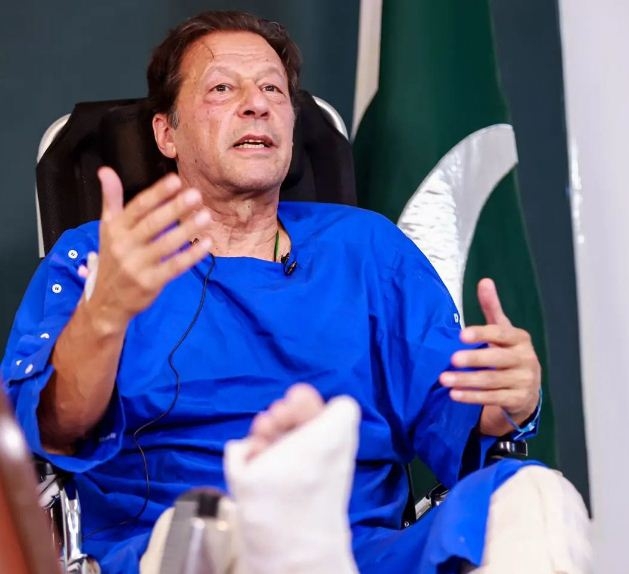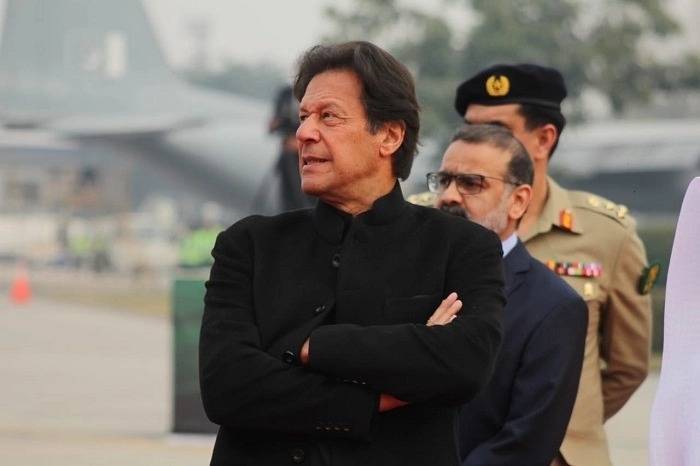Imran Khan’s open blame-game against the military institutions and name calling Gen Bajwa for “illegitimately” ousting his government in April this year has crossed all “red-lines” and rendered him an ‘enemy’ of Rawalpindi … writes Dr Sakariya Kareem
It appears that former Prime Minister Imran Khan’s campaign against the ruling Pakistan Democratic Movement (PDM) coalition government and the powerful military establishment is losing heat. Many analysts are suggesting that Khan has finally understood that he will not have any role in electing the country’s new army chief. The only choice left for him is to mend ties with the security establishment as the new Chief of Army Staff takes the charge later this month. However, it seems unlikely because Khan has crossed all “redlines” by openly attacking the Pakistan Army and Chief of Army Staff Gen Qamar Javed Bajwa.
Pakistan Tehreek-i-Insaf (PTI) leaders are claiming that neither Imran Khan nor PTI-backed President of Pakistan Arif Alvi will show any “resistance or create any hurdle” in the appointment of the new army chief by Prime Minister Shehbaz Sharif. Khan has himself said that he had no doubts about the intentions of candidates for the slot of army chief. These efforts seem desperate and may not bring any relief for Imran Khan in the coming months. On the other hand, in an apparent sycophantic attempt, the ruling PDM coalition is considering amending the Pakistan Army Act, 1952 in a way that would empower the appointing authority — i.e. the prime minister — to retain any candidate through a “simple notification, rather than having to go through a complex, constitutional process.

The PDM government is seeing an opening to improve ties with the military establishment under the new chief. Moreover, Imran Khan’s open blame game against the military institutions and name-calling Gen Bajwa for “illegitimately” ousting his government in April this year has crossed all “red-lines” and rendered him an ‘enemy’ of Rawalpindi. There are reports that some top PTI leaders are considering leaving the party after the assassination attempt on Imran Khan, which was seen as a ‘consequence’ of not following the “orders”. Therefore, it is not surprising that a ‘dissident’ PTI member Ahmad Hassan Dehar presented a resolution in the National Assembly to pay tribute to the services of the Pakistan Army. Whereas the ruling coalition leaders used the occasion to blame Imran Khan for “criticising the state institutions”.
In a recent interview to local journalists, Khan claimed that the establishment exercises “absolute authority” in Pakistan compared to civilian setups. For instance, Gen Bajwa wanted PTI leader Aleem Khan to become Punjab’s Chief Minister and not Usman Buzdar, which created rifts between Khan and the military establishment. He further claimed that Gen Bajwa wanted Pakistan to “vote against the Russian invasion of Ukraine” at the United Nations while Khan’s PTI government was of the view that abstaining would be a “better option”.
It is noteworthy that Khan is sharing all these ‘confidential’ details after the assassination attempt on him and a few weeks before Gen Bajwa’s retirement on November 29.
Many analysts are suggesting that Imran Khan has nothing more to lose now. There will not be general elections in Pakistan before July 2023 and the new army chief will be extremely wary of Khan and his party. Furthermore, the whole Khan-Bajwa episode has put a serious question mark on the army establishment’s strategy of raising a ‘third’ political front in Pakistan. The ‘hybrid’ regime experiment went terribly wrong and has proven very costly to the establishment’s image. Going forward, the future army chiefs in Pakistan will be extremely cautious in picking the country’s civilian leadership, likely relying on the known political stooges, fearing a repeat of the Imran Khan episode.
Therefore, the task at hand for the establishment is to weaken Imran Khan and stop him from participating in future elections. In a recent development, Dubai-based Pakistani businessman Umar Zahoor claimed that he purchased gifts from Pakistan’s state depository or Toshakhana, including a USD 2 million worth Graff wristwatch gifted to Imran Khan by Saudi Crown Prince Mohammad Bin Salman.
According to Pakistan’s law, any gift received from dignitaries of a foreign state must be put in the Toshakhana. Last month, the Election Commission of Pakistan barred Imran Khan from running for political office for five years, after the government agency ruled that he misled officials about gifts he received from foreign leaders while in power.
Khan has claimed that these allegations are part of a “campaign to malign him”. He has decided to sue Geo News and businessman Zahoor in courts in London and the UAE for their “character assassination”, saying he had “no hope in Pakistan’s justice system”.

These allegations will create more legal hurdles for Imran Khan and stop him from participating in elections, rendering him politically useless. In the media interview, Khan conceded that he had differences with the military establishment on the issue of the “anti-corruption drive” against his political opponents. Ironically, Khan is now getting implicated in a corruption case himself, which can be seen as a ‘well-planned’ strategy to hit him where it hurts the most. Consequently, the road ahead for Khan seems rough and full of potholes. He is fully aware that the establishment is unhappy with him, and the recent assassination bid could be a signal of what more is coming his way.

